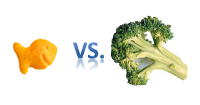The idea for this lesson came from Alison Gopnik’s work studying babies minds. “What’s it like to be a baby? It’s like being in love in Paris for the first time after you’ve had three double espressos” she says. This lesson is an introduction to scientific studies on human beings and aims to replicate Ms. Gopnik’s broccoli vs. goldfish empathy experiment. Her experiment essentially “asks” babies if they can figure out what other people think or feel. She concludes that babies are smarter than we think and around month 18 they can figure out what other people think and feel might not be what they think or feel, that people don’t always want the same thing, and that we should do things to help people get what they want. Amazing huh?
Objective
- 4.2 Apply a variety of assessment methods to observe and interpret children’s growth and development.
Set
- Have students guess what is going on in the baby’s mind. You can show multiple pictures like this one here.
Materials
- Babies 15 mths or less and 18 mths or more
- Broccoli
- Gold Fish
- Two bowls for each child
- Table with two chairs sitting across from one another
Instruction
- Have your students watch the lecture or at least the first five minutes of Alison Gopnik’s lecture so they understand the experiment.
Activities
- Depending on how many children you have assign a child to a student or a pair of students (one can be a silent observer and recorder).
- Students should put the two bowls in front of the child and allow the child to eat.
- The student should then take the bowls and pretend to like either the broccoli or the goldfish.
- The student should slide the bowls back in front of the child and put out his/her hand and say “give me some.”
Extensions
- Try different foods for each student pair and have the students rotate through the children.
- Snap peas vs. Cheerios
- Carrots vs. Teddy Grahams
- Cucumbers vs. M&M’s
- Cherry Tomatoes vs. Pretzels
- Blueberries vs. Cookies
Closing Questions
- Were the outcomes of our experiment consistent with Ms. Gopnik’s findings? What might be some of the reasons why they were/were not?
- Reactions to today’s experiment. What did you learn? What was going through your head as you were conducting the experiment?
- Was our test valid? Why or why not?
Attachments


1 comment for “What do Babies Think?”